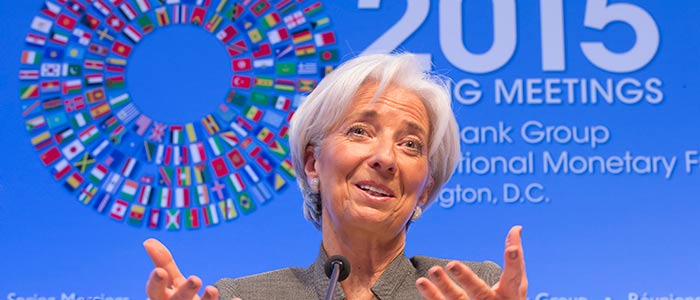WEb_IMF_ChristineLagarde_17169021875_5ac675797e_o.jpg

Christine Lagarde. Credit: IMF Staff Photo/Stephen Jaffe
Speaking in the country’s capital Kampala last week, IMF managing director Christine Lagarde stressed that if Uganda wants to “rise to the challenge of development”, good governance and institutions will be critical, especially in the country’s fledgling oil sector.
“If oil is to contribute positively to Uganda’s future, then it is essential to avoid the ‘curse’ that has plagued many other oil exporters,” she told delegates of a government-hosted event.
“A strong transparency and accountability framework will go a long way to ensuring that the new oil fields serve the national good and benefit all Ugandans.”
But, she continued, strong governance and institutions are needed throughout Uganda’s public sector, as the “cornerstones” of economic growth. Lagarde said that raising taxes to generate revenues for investment will rely on these.
Uganda needs to resolve its infrastructure bottlenecks, she explained, especially in electricity and transportation. Domestic revenues would be needed since relying on borrowing alone would be “unworkable”, she said.
“Uganda is still only halfway to the East African Community’s goal of raising tax revenue equal to 25% of GDP,” she noted.
“What more might be done? One concrete measure might be to strengthen VAT administration and remove some exemptions on the VAT and corporate income tax. The IMF estimates this could raise revenue by 3% of GDP or more.”
She added that better management of investments to ensure maximum value for money will also be key to an infrastructure strategy that can lift growth while keeping debt sustainable.
The World Bank has estimated that improving the management of investments in Uganda could boost annual growth by 2.5 percentage points or more.
Lagarde also recommended pursuing greater regional integration by ensuring connectivity infrastructure was in place, and continuing work on customs, taxes and investment towards this purpose.
Pan-African and regional financial institutions, which moved into the space vacated by other international banks following the global financial crisis, also offer “new opportunities for Uganda”, she said.
Achieving inclusive growth is perhaps the “most important policy challenge of all”, she added.
Lagarde noted that amid a threefold rise in per capita GDP over the past generation, Uganda has reduced extreme poverty to one third of the population.
“If this trend can be continued, there will be clear benefits,” she stated. “It will not be easy. I recognise there will always be competing demands. Governments constantly need to balance priorities.
“For Uganda, even as investment is ramped up, it is essential to make resources available for social spending.”
She called for measures to reduce inequality, such as ensuring good jobs for young people, a strong emphasis on education and healthcare, financial inclusiveness, and assistance for the poor – including a social safety net.
“It is clear that the challenges for Uganda are substantial,” she concluded. “If you tackle these challenges... you can lay the foundation for continued success.”













